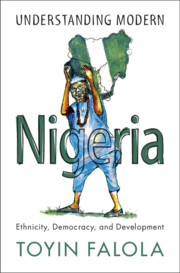Book contents
- Understanding Modern Nigeria
- Understanding Modern Nigeria
- Copyright page
- Dedication
- Contents
- Figures
- Maps
- Preface
- Acknowledgments
- Part I Introduction
- Part II Context and History
- Part III Democracy and Governance
- Part IV Development Crises
- Part V Reforms and Revolutions
- 19 Change Agents: Youths and Politics
- 20 Hashtags and Social Protests: Reformation and Revolution in the Age of Social Media
- 21 Reformist Option: Grassroots and Political Activism
- 22 Revolutionary Option: Social Movements and Power to the Citizens
- 23 Nationalist Ethos, Collective Reformation, and Citizenry Power
- 24 Popular Culture and Politics
- Part VI Conclusion
- Bibliography
- Index
22 - Revolutionary Option: Social Movements and Power to the Citizens
from Part V - Reforms and Revolutions
Published online by Cambridge University Press: 09 June 2021
- Understanding Modern Nigeria
- Understanding Modern Nigeria
- Copyright page
- Dedication
- Contents
- Figures
- Maps
- Preface
- Acknowledgments
- Part I Introduction
- Part II Context and History
- Part III Democracy and Governance
- Part IV Development Crises
- Part V Reforms and Revolutions
- 19 Change Agents: Youths and Politics
- 20 Hashtags and Social Protests: Reformation and Revolution in the Age of Social Media
- 21 Reformist Option: Grassroots and Political Activism
- 22 Revolutionary Option: Social Movements and Power to the Citizens
- 23 Nationalist Ethos, Collective Reformation, and Citizenry Power
- 24 Popular Culture and Politics
- Part VI Conclusion
- Bibliography
- Index
Summary
“Revolutionary Option: Social Movements and the Power to the Citizens” explores the entanglements between culture, security, and development. The interfaces between development and historical events are also explored, as well as the place of social movements in the history and advancement of Nigeria. It draws on three theoretical templates comprising three scapes and habitus that shape intellectual thinking and routine practices. These scapes and habitus form linkages and intersections between so many variables. The masses of Nigeria have not exercised the privilege of creating new forms of power, economy, and organization that can supplant those that fail. The scapes and habitus they have acquired and operate within are machinations of the political class that want to hold onto power. In other words, the people have neither overthrown the political structures they dislike nor, even more importantly, created alternative ones. This study identifies the lack of people’s involvement in deliberations on development and politics. Therefore, forces of repression may break some spirits, and the use of bribery and corruption may divide the ranks, but the masses are never deceived. Revolts, strikes, and protests might have failed, but not the desire to think of possibilities.
- Type
- Chapter
- Information
- Understanding Modern NigeriaEthnicity, Democracy, and Development, pp. 539 - 560Publisher: Cambridge University PressPrint publication year: 2021

